 |
|
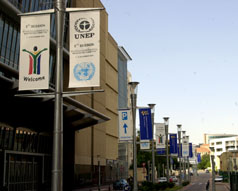 Friday, 8 December
Friday, 8 December
Delegates met
in morning, afternoon and evening Plenary sessions to consider Articles
D (Measures to reduce or eliminate releases), I (Research development
and monitoring), H (Public information, awareness and education),
O (Conference of the Parties), V (Entry into force) and L (Reporting).
Contact Groups on Article F (Listing of chemicals in Annexes A,
B and C) and Wastes, as well as the informal group on Article K
(Financial resources and mechanisms), also convened during the day.
|
 The WORLD ALLIANCE FOR BREASTFEEDING ACTION called for women's
participation to be ensured in the convention.
The WORLD ALLIANCE FOR BREASTFEEDING ACTION called for women's
participation to be ensured in the convention. |
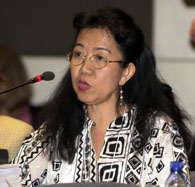 |
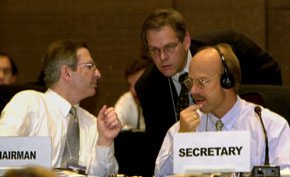
|
 Chair Buccini started the penultimate day of POPs-5 with
a warning on the amount of work that needed to be accomplished, and
laid out new ground rules for the last two days of INC-5. From
left to right: Chair Buccini consulting with David Ogden, INC
Coordinator; and Jim Willis, Director of UNEP Chemicals Division.
Chair Buccini started the penultimate day of POPs-5 with
a warning on the amount of work that needed to be accomplished, and
laid out new ground rules for the last two days of INC-5. From
left to right: Chair Buccini consulting with David Ogden, INC
Coordinator; and Jim Willis, Director of UNEP Chemicals Division.
|
Richard
Ballhorn (Canada), Chair of the
Contact Group on Art. D4 (Wastes) |
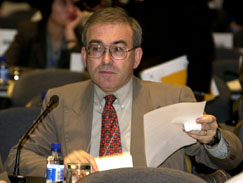 |
Reports
from the Contact Groups:
 Update from Contact Group on Art. D1 and D2 (Prohibition and
Restriction): Hinchcliffe highlighted, and delegates briefly
discussed, New Article R Bis on a Registry of Country
Specific Exemptions and Review Progress. He later reported
clear advice from the LDG that the current approach adopted
for the Registry may breach international law, but that the
LDG could produce a "bare bones" architecture setting up the
Registry and provide for the COP to further elaborate it.
Discussion was suspended.
Update from Contact Group on Art. D1 and D2 (Prohibition and
Restriction): Hinchcliffe highlighted, and delegates briefly
discussed, New Article R Bis on a Registry of Country
Specific Exemptions and Review Progress. He later reported
clear advice from the LDG that the current approach adopted
for the Registry may breach international law, but that the
LDG could produce a "bare bones" architecture setting up the
Registry and provide for the COP to further elaborate it.
Discussion was suspended. |
|
| SWITZERLAND
supported the general exemption approach over specific exemptions
in the chapeau in Annex A (Elimination), Part I |
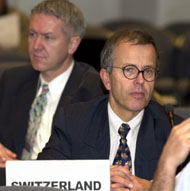 |
 |
SAUDI ARABIA
said that imports and exports of wastes would fall under the Basel
Convention. |
|
|
 Late evening update on the status of Art. D3 (Byproducts):
Contact Group Co-Chair Arndt (Germany) introduced the text
forwarded to Plenary by the Group. Arndt highlighted remaining
brackets in the chapeau and the provision on substitutes,
and two bracketed alternative proposals for the provision
on use of Best Available Techniques (BAT) for new sources.
One option requires the use of BAT for new source; the second
promotes and, in accordance with the implementation schedule
of its action plan, requires the use of BAT for new sources
within source categories that a Party has identified as warranting
such action. The second option further requires that BAT be
phased-in no later than four years after entry-into-force.
Late evening update on the status of Art. D3 (Byproducts):
Contact Group Co-Chair Arndt (Germany) introduced the text
forwarded to Plenary by the Group. Arndt highlighted remaining
brackets in the chapeau and the provision on substitutes,
and two bracketed alternative proposals for the provision
on use of Best Available Techniques (BAT) for new sources.
One option requires the use of BAT for new source; the second
promotes and, in accordance with the implementation schedule
of its action plan, requires the use of BAT for new sources
within source categories that a Party has identified as warranting
such action. The second option further requires that BAT be
phased-in no later than four years after entry-into-force.
|
|
 |
MEASURES
TO REDUCE OR ELIMINATE RELEASES (ARTICLE D): New Chemicals: In
the evening, Nigeria, on behalf of the G-77/CHINA, proposed that the
production and use of new pesticides or industrial chemicals be prevented,
with deletion of previously agreed language also referring to regulation.
AUSTRALIA opposed, saying that its national legislation requires the
word "regulate". This text was left for resolution on Saturday.
|
 Closing the day's work at almost midnight, Chair Buccini
noted text forwarded to the LDG and stressed that "the
word of the day for tomorrow has to be 'compromise'"
Closing the day's work at almost midnight, Chair Buccini
noted text forwarded to the LDG and stressed that "the
word of the day for tomorrow has to be 'compromise'" |
|
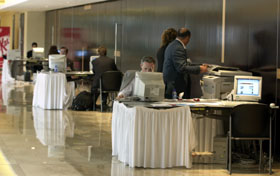 |
The ever-popular
cyber-cafe |
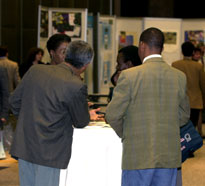 |
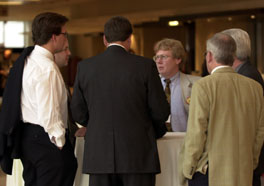 |
|
On the penultimate day of POPs-5, the corridors of the Sandton Convention
Center were littered with groups of delegates (above left)
and observers (such as the business representatives, above right)
huddled in the corridors over draft text. "It's amazing how many
brackets dissappear over coffee", said Chair Buccini. |
In
the corridors...
The language of compromise
began to echo in the corridors Friday, with at least one participant stating
that the forming agreement "may not be perfect, but it has to happen."
Others pointed out that last minute concessions and late night sessions
are not unusual in international negotiations, with various delegations
simply trying to get the best possible deal. One observer suggested that
this display of brinksmanship was almost certainly the case regarding
the sometimes edgy deliberations over language involving the precautionary
principle. However, a note of caution was sounded by another participant
regarding the number of brackets in the working draft article on a financial
mechanism.
|











